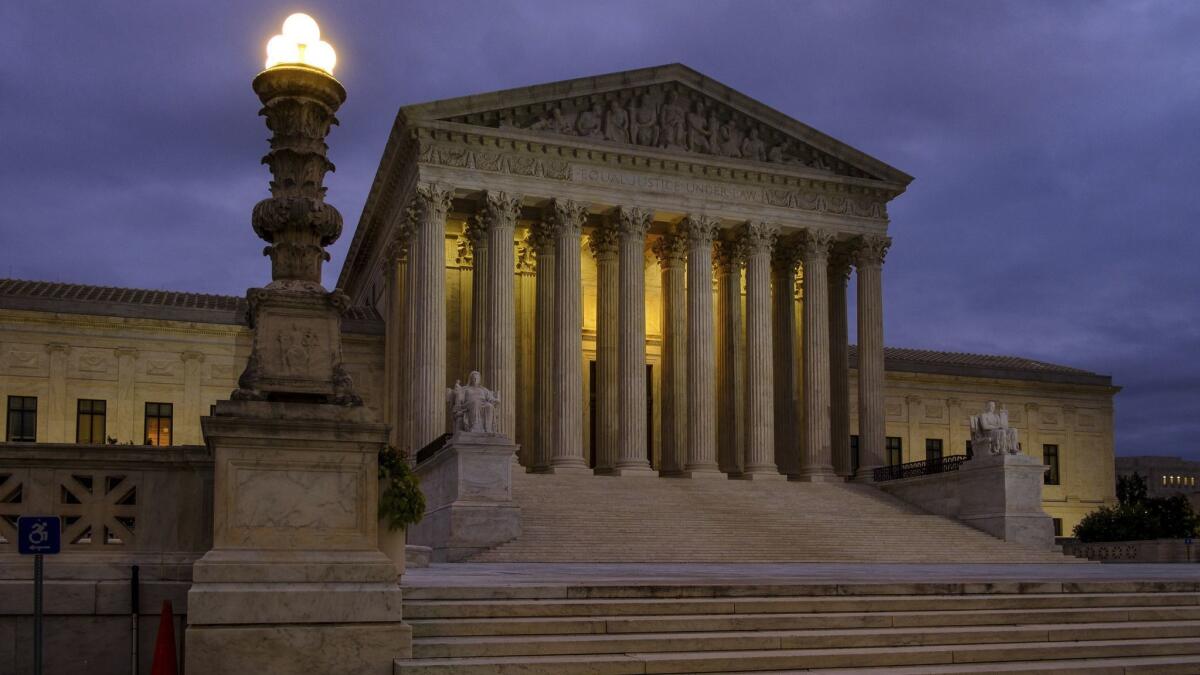Op-Ed: Want less political courts? Shift power away from Washington

- Share via
The rule of law is supposed to be different from enforcing policy preferences. Yet attaching partisan labels to judges has become almost inevitable now because methods of legal interpretation largely track with our ideologically sorted parties.
If you’re an originalist — if you believe that the meaning of a constitutional provision is the same now as when it was ratified — only a Republican president will appoint you. If, on the other hand, you think that the Constitution changes to adapt to social norms, then you better hope for a Democratic White House.
The contretemps over Brett Kavanaugh’s nomination is the culmination of a tit-for-tat escalation between these competing camps. It doesn’t really matter where it began. Today’s brinksmanship in the Senate is symptomatic of a larger problem: the self-corruption of the Supreme Court as it has aided and abetted the expansion of federal power by Congress and the executive branch.
For the nation’s first 150 years, the Supreme Court hardly ever had to strike down a law because Congress generally stayed within its bounds, subject also to the presidential veto. In 1887, for example, President Cleveland vetoed an appropriation of $10,000 to buy seeds for farmers in drought-stricken Texas because he could find no constitutional warrant for such action. But as government expanded, so did the laws and regulations over which the court has power.
Enter the Fray: First takes on the news of the minute from L.A. Times Opinion »
It was during the Progressive Era that the idea emerged that the General Welfare Clause justifies any legislation that gains a congressional majority — as opposed to limiting federal reach to truly national issues. After 1937, the court began approving grandiose legislation of the sort it had previously rejected. It wouldn’t again strike down legislation for exceeding federal power until 1995. The New Deal court thus laid the foundation for politicized judicial mischief of every stripe — be it letting laws sail through that should be struck down or striking down laws that should be upheld.
Depoliticizing judicial nominations is a laudable goal, but that’ll happen only when judges stop ratifying the growth of the federal government. And the only lasting solution is to devolve power to the states, so that far fewer big decisions for the whole country are being made in Washington. Federal courts will still need to step in when local governments violate individual rights, but there will be less political toxicity if the feds aren’t constantly generating one-size-fits-all mandates.
And so whatever one thinks about Sen. Lindsey Graham’s role in the Kavanaugh fight, he — and several others, including those who cast critical votes — are wrong to say that senators should defer to any president’s choice, so long as the nominee is qualified to be a justice. For senators and citizens alike, it’s absolutely appropriate to question judicial philosophy — and to vote accordingly.
Ilya Shapiro is a senior fellow in constitutional studies at the Cato Institute.This piece is part of a series on what’s next for the Supreme Court. Click here to read more.
Follow the Opinion section on Twitter @latimesopinion and Facebook
More to Read
A cure for the common opinion
Get thought-provoking perspectives with our weekly newsletter.
You may occasionally receive promotional content from the Los Angeles Times.









